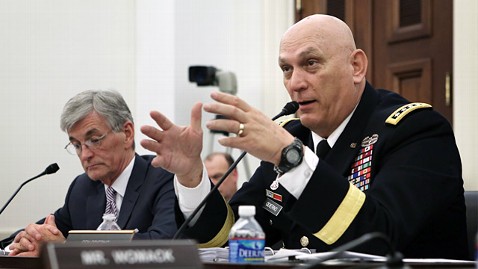Army Leaders: Sequestration Could Hurt Fight Against Sexual Assault

(Image Credit: Alex Wong/Getty Images)
The secretary of the Army and the Army chief of staff have told senators that sequestration could hurt efforts to deal with sexual assaults within their branch of the military.
In a written statement submitted to the Senate Armed Services Committee on April 23, Army Secretary John McHugh and Army Chief of Staff Gen. Raymond Odierno said the across-the-board budget cuts mandated as part of the sequester could hurt their Sexual Harassment/Assault Response and Prevention Program "from slowing hiring actions, to delaying lab results which hinders our ability to provide resolution for victims."
A Defense Department study released Tuesday showed there were 3,374 reports of sexual assault made in 2012, and DOD estimated a total of 26,000 instances of unwanted sexual contact occurred.
The Army has had the highest rate of victims reporting sexual assault compared to active duty military service among the five branches, at least since 2007.
In their oral testimony in April, the Army leaders stressed the importance of working with soldiers from their first days in the service through the rest of their military careers to ensure they see sexual harassment and assault as serious problems.
"It is just about constantly talking about this problem and constantly ensuring that people understand we are going to take this seriously. And it's as frustrating to all of us, I know, as it is to you, senator," Gen. Odierno told Senator Kay Hagan. "I wish I had a better answer for you frankly."
The statement from April said the Army planned to add 829 full-time military and civilian sexual assault response coordinators and victim advocates to combat the problem within the branch.
Wednesday the Army Secretary told the Senate Armed Services Committee that the Army faces $7.6 billion in sequestration cuts between April and September. Gen. Odierno said that in part has left them with a $13-billion budget shortfall and requested Congress delay the cuts for the Army for "later years."
"We are sacrificing readiness to achieve reductions inside the short period of the fiscal year. And unfortunately, readiness can't ever be bought back, because there's a time component of readiness," he said. "It's just not the size of the cuts but it's the steepness of the cuts required by sequestration, especially close in, which make it impossible to downsize the force in a deliberate, logical manner that allow us to sustain the appropriate balance between readiness, modernization and end strength."
Army Public Affairs Officer Lt. Col. S. Justin Platt told ABC News Thursday that despite sequestration, "the Army will continue provide care, support and treatment for" victims of sexual assault.
Lawmakers met with members of the Obama administration at the White House Thursday afternoon to discuss how to combat sexual assault in the military going forward.